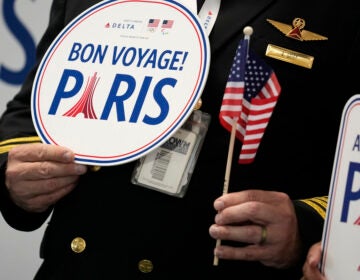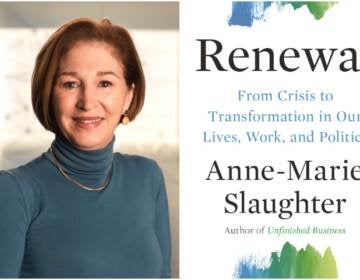And now for something completely different: British humor
If Britain has its eccentrics and wits, can America lay claim to its own kind of drollery? Or are we hampered by political correctness or the fear of offense?

British actor Rowan Atkinson, playing his character Mr. Bean, arrives for a meeting with photographers in Madrid in 2007. (AP Photo/Daniel Ochoa de Olza, file)
Tina Brown, who came to the U.S. as editor first of Vanity Fair and, later, of the New Yorker, loved New York and brought with her what one reviewer of her recently published diaries called her “natural British irreverence.”
She herself decried what she saw as an American absence of irony or eccentricity, a view shared by the author Martin Amis, whom she once dated and who was also a transplanted Brit in the U.S. The equally irreverent Amis remarked, “Americans aren’t as witty as Brits, because humour is about giving a little bit of offence. It’s an assertion of intellectual superiority.“
I think it’s more than that. A letter to the editor of the Financial Times from an émigré Brit, responding to an article in that paper titled “Why British banter gets lost in translation,” referred to what he called “the ghastly, uncomprehending silences that follow a British one-liner or a caustic remark.” He continued: “This mutual incomprehension is further aggravated when the literal-minded American replies with ‘That’s funny,’ a response guaranteed to bring the verbal tennis match to a crashing halt.”
True. There is a tendency here to compartmentalize the serious from the humorous. An American public speaker, no matter how serious the topic, will tend to keep it serious; Brits, on the other hand, like to blend humor into the topic. And nowhere is this more apparent than with TV commercials in which humor, with the possible exception of those from GEICO and a handful of other advertisers, are achingly serious and uncreative.
There are differences in wit and humor on either side of the Atlantic. (And let me also note my possible bias as a transplanted Brit who has lived in the U.S. for 30 years.) One theory is that, since Americans are taught such egalitarian platitudes as the notion that anyone can become president, American humor tends to be positive, upbeat. The Brits, on the other hand, derive much of their humor from failure or oddity. Think of Mr. Bean and the Minister of Silly Walks.
A further difference is that British humor is not averse to the mildly obscene — Benny Hill being a good example of that, as is the limerick. Another possible difference is whimsy. Monty Python epitomizes that, but also Lewis Carroll’s “The Walrus and the Carpenter” and Edward Lear’s “The Owl and the Pussycat.”
So if Britain has its eccentrics and wits, can America lay claim to its own kind of drollery? Or are we hampered by political correctness or the fear of offense?
Hereabouts, humor owes much to the wits of the Algonquin Round Table: Dorothy Parker, James Thurber, and Robert Benchley, who, in a 1920 literary review of the New York City phone book, created one of my favorite witticisms. “There may be said to be two classes of people in the world; those who constantly divide the people of the world into two classes, and those who do not,” he wrote.
“Both classes are extremely unpleasant to meet socially, leaving practically no one in the world whom one cares very much to know,” he added.
Americans lay claim to the mordant humor of H.L. Mencken, who once wrote with some prescience: “On some great and glorious day the plain folks of the land will reach their heart’s desire at last, and the White House will be adorned by a downright moron.”
Add the whimsy of the American humorist Ogden Nash and his “The Turtle”:
The turtle lives ‘twixt plated decks
Which practically conceal its sex.
I think it clever of the turtle
In such a fix to be so fertile.
W.C. Fields, S.J. Perelman, Art Buchwald, and Ambrose Bierce all hoisted the flag for American humor in their rather gentle, tongue-in-cheek, sexless ways. In more recent times, so did George Carlin and Joan Rivers, so do Samantha Bee and Tina Fey, with a more overt, boundary-pushing humor, less the domain of men.
So, can Americans appreciate British humor, and vice versa?
Some British humorists such as Charlie Chaplin did cross the Atlantic and found receptive audiences on this side. More recently, such British late-night comedians as John Oliver have also found a hospitable audience here. The British, in turn, appreciate such modern American humor as “Seinfeld” and “Frasier.”
The differences are not just cultural, they’re generational. Moreover, I think that those differences are narrowing. The next time you hear that the Brits have a monopoly on sophisticated humor, watch “Curb your Enthusiasm” or, more recently, “The Marvelous Mrs. Maisel.”
It’s also true that British humor may be losing a bit of its bite and sting. My friend Oliver St. Clair Franklin, U.K. honorary consul in Philadelphia, reminded me about raconteur Gerard Hoffnung’s speech to the Oxford Union, which might have been hilarious in 1958, but to both British and American ears must now seem totally passé.
Who does it better? Perhaps this former Brit and now fully transplanted American might hazard a possible answer. It’s a bit like the U.S. and the U.K. being two countries separated by a common language. Though, perhaps we are two nations not separated by humor, but reinforced by it.
WHYY is your source for fact-based, in-depth journalism and information. As a nonprofit organization, we rely on financial support from readers like you. Please give today.





